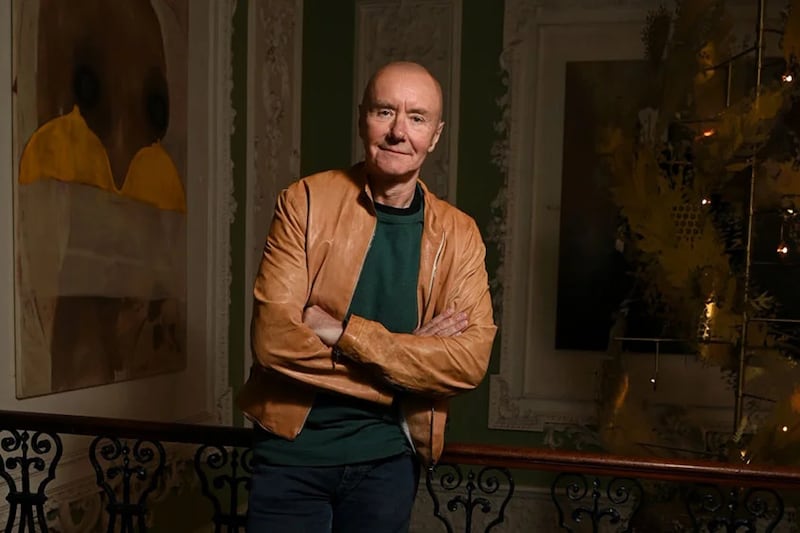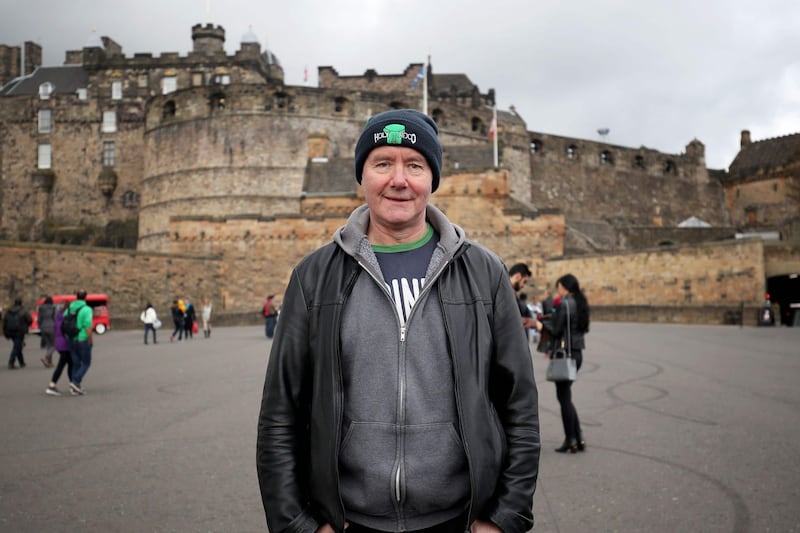NEWS that filming is finally under way on the long-awaited Trainspotting 2 couldn't have come soon enough for fans. But did Irvine Welsh – who wrote the novel the first film was based on, and who's follow-up, Porno, has again been adapted for the movie sequel – worry that it'd be a tough act to follow? It seems not.
"The thing is, if you have your book adapted, you're in the casino playing with the house money," he explains. "If it's a failure, you can say, 'They messed up my book'. If it's a success, you can say, 'Ah, well they had the source material from my book'. You're in a complete win-win position."
The sharp Scotsman is naturally funny, a trait which has seeped into his otherwise gritty, violent tales of life in Edinburgh among an eclectic mix of down-at-heel characters, often high on drugs or engaged in scams, murders and other criminal activity.
Anyone familiar with Welsh's writing will recognise his psychotic Scottish anti-hero Frank Begbie, who first appeared in his debut novel Trainspotting, published in 1993, and in the screen adaptation which starred Robert Carlyle and Ewan McGregor, and achieved cult status.
Welsh will be reprising the role of Mikey Forrester, Begbie's sidekick, in Trainspotting 2, and is also executive producer for the movie.
"They gave me a lot of money and a fancy title – executive producer; I don't know if that means you've got to earn your corn or keep out of the road. I will be keeping out of the way, unless I'm asked to do something specific.
"I've been helping Danny Boyle already, going over the script with him, and have put him in touch with a lot of people – creative people, ex-addicts and people on the streets who know the lie of the land and the pulse."
He agrees that to succeed, the sequel needs to be very different from the original.
"So it has to be a movie about the infantilism of middle age," he begins. "We're supposed to stay as young as possible until we physically crumble and fall apart. Until then, we're supposed to go out and see bands, have affairs and take drugs. It has to explore that kind of phenomenon and that folly. If it's allowed to be perceived for what it is, it will be great."
They've had to readjust ages – in Porno, the characters were nine years older than in Trainspotting, but the actors are now 20 years older.
Like his creations, the working-class boy-made-good did his share of drugs in his youth, but like Begbie – who returns in Welsh's latest novel, The Blade Artist – his life has moved on.
Begbie has reinvented himself in the new book, as Jim Francis, and carved a new life in California, as an artist of grotesque celebrity portraits. He has a new wife Melanie – an art therapist he met in prison – and two young daughters.
But the violent murder of the drug addict son he hardly knew takes him back to Edinburgh, and some of the characters in the dark world of his old life.
Welsh has also made a better life across the pond. He's lived in Chicago for the last six years with his American wife Elizabeth, who rides dressage horses, and before that lived in San Francisco and Los Angeles (as well as Dublin and Amsterdam).
He still has a flat in his native Edinburgh, where he spends two or three months of the year.
"I still see Scotland as home. It feels like I nipped out for a pint of milk, never came back and the milk's gone a bit sour, so I really should get home."
He's prolific on Twitter – and welcomes trolls.
"I'm trolled all the time. It's one of the best things that can happen if you're a writer, especially if you write dark stuff about characters that are messed up. You can go into the trolls' timelines and see all the things they are into, and there's usually a lifetime of pain and inadequacy there.
"Normally, I would have to sit by these people on a bar stool and talk to them to get all that, but I don't have to do that now. It's fabulous research!"
He has adopted some of the US healthy lifestyle habits and says he he's cleaned up his language, although his conversation today is peppered with expletives.
"I've run marathons, I play tennis, I go to the boxing club all the time and do road-running. Now I've stopped all the hedonistic stuff, I just have that left.
"I used to do epic binges and parties that lasted for three or four days, but I can't do that any more. It's not just the fact that I'm not up to it physically or mentally, I don't want to. I'm pretty bored by it."
Yet fans still try to slip him dope at book signings, he reveals.
"The first thing I do when I get back to the hotel is flush everything away down the toilet. Years ago, I would have taken it all but now I have to get rid of it."
"As I get older, the audience seems to get younger, and a lot of kids who read Trainspotting think, 'Oh this guy must be f***ed up so I'll give him some drugs'. But they shouldn't give them to an old fart like me."
It's taken years for the original cast to return for the Trainspotting sequel – this year marks the 20th anniversary of the first film's release – and Welsh is pleased it's finally happening.
"It feels like a band getting back together again," he notes enthusiastically.
He currently has several other film and projects on the go, preferring the Hollywood attitude to film-making.
"If you're in that game, it's the place to be. They want talent, and if you are talented they want you to be there, in a way that Britain doesn't. Britain is still much more about class, about who you went to school with and your social connections. That's not in the equation in Hollywood," he explains.
"The top people in film and TV in Britain will see me as a guy who's written a book about low-life people who has lucked out, and is doing the same again. They won't have those cultural blinkers in Hollywood. They see me as a very successful grafter who's going to work hard for them.
"Trainspotting was a massively profitable film. From practically zero costs by Hollywood standards, it made a fortune. That's the thing that they see – the cost to profit ratio."
:: The Blade Artist by Irvine Welsh is published this week by Jonathan Cape.








